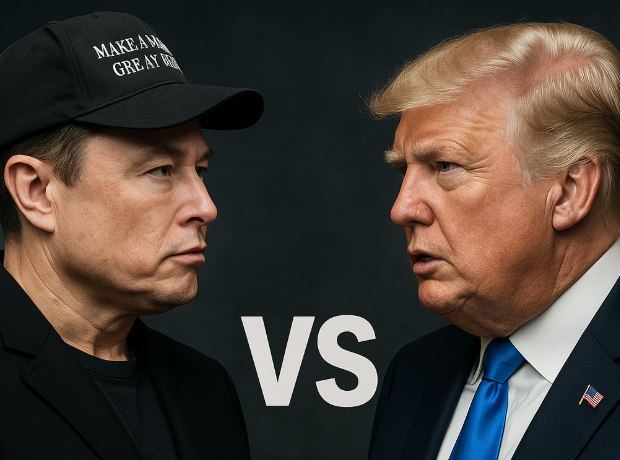
In a surprising turn of events, the once-close relationship between Elon Musk and Donald Trump has deteriorated into a full-blown public feud. The two, who were previously seen as strong allies—with Musk even appearing at Trump’s political rallies—are now engaged in a bitter conflict that could have far-reaching consequences for businesses, markets, and even global trade.
The Breaking Point: Policy Clashes and Business Impact
The root of the conflict lies in Trump’s policies, particularly the proposed "One Big Beautiful Bill." This bill, which is nearing approval, includes significant tariff hikes and tax reforms that could negatively impact global trade. While Trump claims these measures will strengthen the U.S. economy, critics, including Musk, argue that they could trigger a recession and severely damage businesses—especially those reliant on international markets, like Tesla.
Musk has openly criticized the bill, warning that increased tariffs would make Tesla vehicles less affordable, hurting sales and potentially destabilizing the company. His concerns were validated when Tesla’s stock plummeted nearly 17% in a single day, wiping out around $152 billion in market value—equivalent to the entire market cap of a major firm like TCS. Investors are now questioning whether Musk’s businesses, including Tesla, SpaceX, and X (formerly Twitter), are safe bets amid this political turmoil.
The Electric Vehicle Debate
Another major point of contention is Trump’s longstanding opposition to electric vehicles (EVs). Unlike the Biden administration, which promoted EV adoption through subsidies and regulations, Trump has dismissed climate change concerns and even mocked EV supporters. Musk, whose wealth and influence are deeply tied to Tesla’s success, finds himself at odds with Trump’s pro-fossil fuel stance.
Trump’s policies could reverse years of progress in the EV sector, directly threatening Tesla’s growth. Musk, realizing the stakes, has begun aggressively pushing back—even suggesting the formation of a new political party to counter Trump’s influence. While Musk cannot run for U.S. President (as he was born in South Africa), he could back an alternative candidate, such as J.D. Vance, to challenge Trump’s dominance.
Escalating Tensions: Personal Attacks and Power Struggles
The feud has turned increasingly personal. Musk recently claimed that Trump owed his election victory to him, implying that without his support, Trump would have lost. Meanwhile, Trump has hinted that Musk was aware of his policies beforehand—a claim Musk denies.
As the battle escalates, Musk’s companies face uncertainty. Trump could introduce policies specifically targeting Musk’s ventures, while Musk may leverage his influence to weaken Trump politically. The situation has left investors nervous, with Tesla’s stock volatility reflecting broader market anxiety.
Global Market Implications
The Musk-Trump clash isn’t just a U.S. issue—it has global repercussions. If Trump’s tariffs are implemented, international trade could suffer, affecting economies like India that rely on exports. Additionally, a U.S. recession triggered by these policies could send shockwaves through global markets.
Key Takeaways
Policy Risks for Musk’s Empire – Tesla, SpaceX, and X could face regulatory and financial challenges under Trump’s administration.
EV Industry Under Threat – Trump’s anti-EV stance may slow down the sector’s growth, impacting Tesla and competitors.
Political Maneuvering – Musk’s potential entry into politics signals a new front in this battle, with long-term implications for U.S. leadership.
Market Volatility – Investors should brace for further turbulence as this feud unfolds.
What’s Next?
All eyes are now on the "One Big Beautiful Bill." If passed, it could deepen the rift between Musk and Trump, leading to more aggressive moves from both sides. Meanwhile, markets will remain sensitive to any developments, making it crucial for investors to stay updated.
For now, one thing is clear: the Musk-Trump feud is more than just a personal spat—it’s a high-stakes conflict with the power to reshape industries, economies, and political landscapes worldwide.




